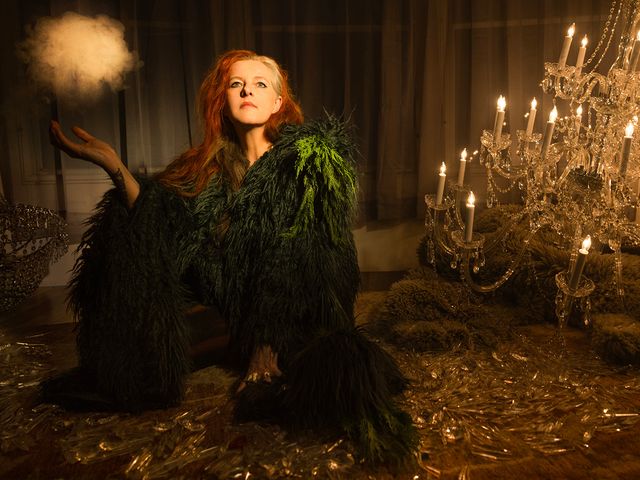To kick off her recent memoir, The Harder I Fight the More I Love You, Neko Case steps into the shoes of her younger self, about to perform a dive bar gig that, as far as her nerves are concerned, might as well be the Super Bowl halftime show. “My job at that moment is to conjure a small dust devil of unreality around us, to pull it up out of a sticky, shiny carpet and flappy, beer-soaked speaker cones,” she writes. “I have to make it out of words and sounds and looks.”
So has been her ethos for the past three decades. At this point it feels wrong to call Case a country artist when her work most closely resembles a feral strain of baroque pop—Nilsson at a truck stop, Kate Bush running with raccoons as well as foxes. Her new album, Neon Grey Midnight Green, arriving right on the heels of her book, is something of a career retrospective, but it is also the 55-year-old Case at her most immediate and daring. Her last foray into autobiographical songwriting plunged into darkness and excavated the muck; Neon Grey sprouts upwards, pushing a newfound wonder for life’s mysteries up through the grass for all to see.
The album’s title, taken from the meeting of slate-colored clouds and conifer forests on the Pacific Northwest skyline, conjures up the familiar sense of vengeance and foreboding found across Case’s other releases. But its overwhelming feelings are gratitude and awestruck revelation. “I’m a meteor shattering around you/And I’m sorry/I’ve become a solar system/Since I found you,” she declares on lead single “Wreck.” Neon Grey was made in collaboration with the 20-piece PlainsSong Chamber Orchestra, conducted by Sara Parkinson and arranged by Tom Hagerman, and recorded live with the full band. The result is at once all-encompassing and strikingly intimate. In the past, Case’s crystalline voice stood alone against the foggy, widescreen neo-noir of songs like “Deep Red Bells” and “Curse of the I-5 Corridor.” Amid all the strings and woodwinds and harps, bolstered by the usual guitars and brush-tapped drums, her heartfelt lyricism manifests as one massive floodlight, daring you to gaze straight-on.
Case has spoken about losing several close friends and colleagues in the years since 2018’s Hell-On, including longtime collaborator Peter Moore and Dexter Romweber of Flat Duo Jets, her favorite band. The latter inspired the beautiful “Winchester Mansion of Sound,” retelling a day spent together walking along train tracks. Case’s emotion for him is raw and effusive, until she snaps back to the present to steer her audience away from cliché: “If you think I’m talkin’ ’bout romance/You’re not listening.” She backtracks over herself in these asides and run-ons and revisions, including in the music itself, which frequently changes tempo partway through a song to match the cadence of Case’s memories. The concept of time, via tidal waves or ticking clocks or a spider building its web, reappears across the album like an urgent spectre. That’s the double-edged sword of grief—debilitating as it may be, it can drive a person toward a more fervent truth-telling, a need to lay out exactly who or what was lost and make certain it is not forgotten. If Hell-On was Case’s plea to heed the warnings of nature and the changing planet, Neon Grey is a grand eulogy for lives she’s already said goodbye to, including versions of her own.

